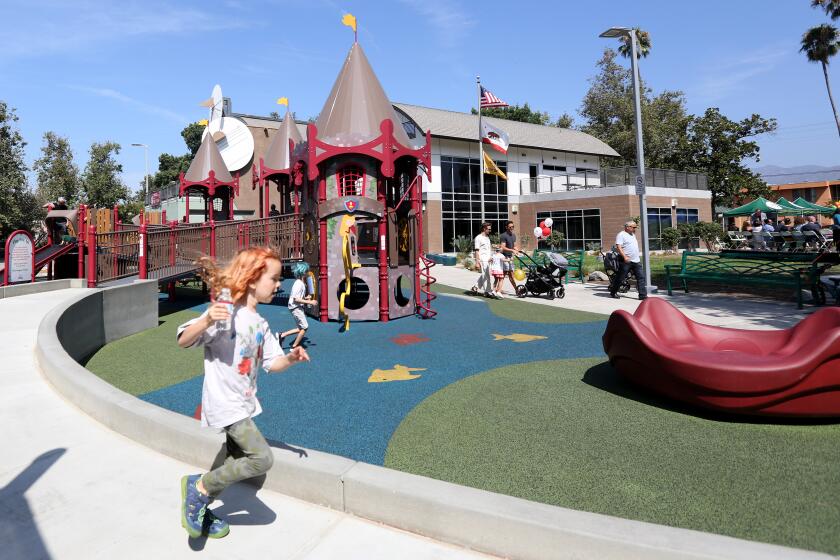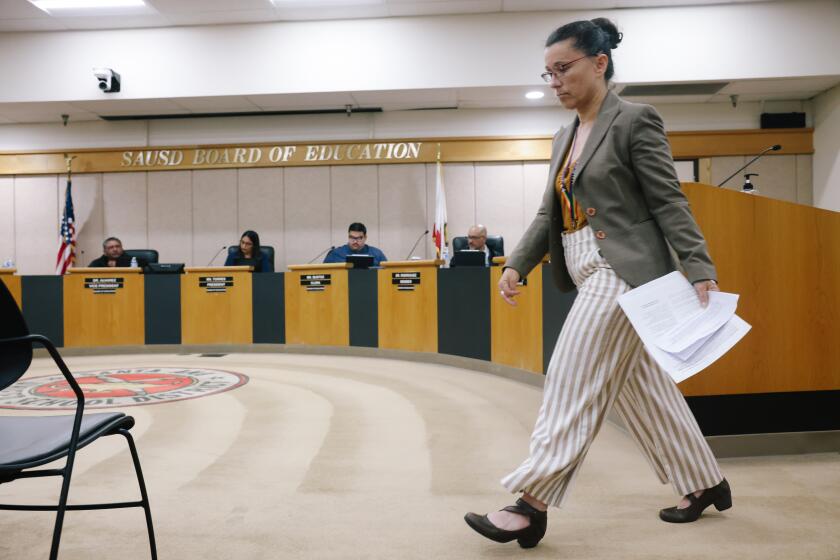Big Brothers Big Sisters of Orange County seeks mentors
- Share via
It’s national mentorship month, and Big Brothers Big Sisters of Orange County and Inland Empire is looking for volunteers.
The mentoring organization has been in operation for more than 115 years nationwide with the O.C. and Inland Empire branch ranking second in size, serving about 4,000 kids a year, according to CEO Sloane Keane.
For the record:
2:43 p.m. Jan. 26, 2021An earlier version of this story did not clarify that the number of program matches were related to the O.C. site only. It also misspelled the name of William Burroughs.
The O.C. branch started in a residential Tustin garage in 1958 before moving into 1801 E. Edinger Ave. in Santa Ana seven years ago. The organization owns the building and rents out half of the property to other nonprofits.
The programs vary from traditional one-on-one matches, couples matched with one child or teen, a high school volunteer mentoring an elementary school student and a corporate employee mentoring a high school student.
The latest program, College Bigs, which launched at the end of 2020, matches first-generation college students with high school students. Chapman University and UC Irvine are participating institutions.
In 2020, the number of site-based program matches decreased to 1,586 compared to the 2,227 matches in 2019.
“Every child who’s in our program has their own unique and specific mentor,” Keane said. “A lot of that is done face to face so we had to shift that overnight and become virtual.”
As parents delay crucial immunizations for their children due to fears of exposing them to COVID-19, Orange County pediatricians are concerned about future outbreaks of measles, whooping cough and meningitis.
Museum docents became science instructors teaching kids how to make slime out of glue. Some became TikTok dance instructors. Volunteers turned into tutors providing additional support to the challenges of virtual learning. Others became a lifeline to essential needs like food.
One of the programs that decreased in activity was high school volunteers mentoring elementary school students. Keane said most of the elementary students were unreachable, so they shifted their focus to the high school students they were already working with — some of whom had to get jobs or take care of younger children in their households during the pandemic.
The organization also went through a small round of layoffs last year, but Keane said “fortuitously, we have a really strong group of supporters in Orange County who have been with us for over 60 years. They kind of rallied around us in our organization to ensure that we were able to continue to support the children we had and the opportunity to grow if the volunteers presented themselves.”
William Burroughs, who lives in Huntington Beach, is an example of a traditional one-on-one mentoring match — the type of program that Keane said has continued to thrive.
Three years ago, Burroughs applied as a mentor and was paired with Andrew, a 13-year-old who lives in Tustin.
Burroughs said he and Andrew are a perfect match and have the same interests. Prior to coronavirus restrictions, they frequented Chuck E. Cheese, played their favorite game, Plinko, and loved going to the beach. Most of their current communication is over FaceTime and Skype or dropping off cheese pizza for the family.
Burroughs added part of the reason why they were a perfect match is because both of their fathers died. Andrew’s mother placed him in the program because she wanted a male role model for him. The system the organization uses to find matches also looks for similar experiences.
“The one thing that sets Big Brother Big Sister apart from elsewhere is the mentee has to agree that they want to be a part of the program,” Burroughs said. “It’s not something forced upon that child.”
The application process is thorough. Mentors have to be at least 18 years of age, pass a background check, have a valid driver’s license and insurance and commit to at least one year of the program. A case manager is assigned to find the best matches and ensure child safety. Volunteers go through a series of interviews with the case manager and the parent before approval.
“We are able to operate because of volunteers,” Keane said. “We need volunteers, specifically men. We have over 400 little boys right now waiting for a Big Brother.”
Mentor applications can be found online through ocbigs.org/volunteer.
All the latest on Orange County from Orange County.
Get our free TimesOC newsletter.
You may occasionally receive promotional content from the Daily Pilot.





